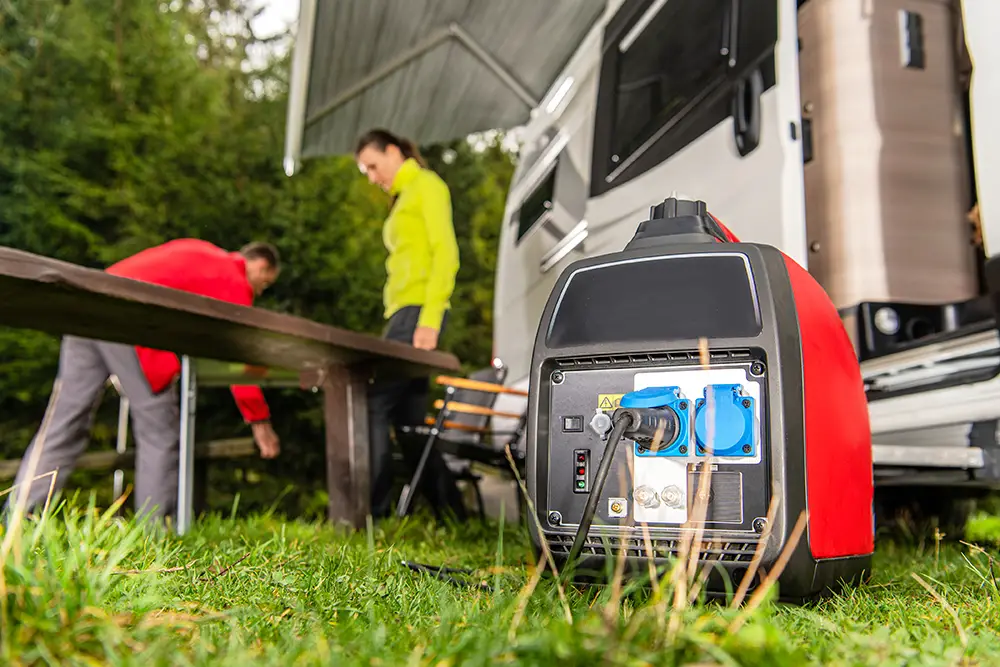If you are a regular traveler, you will know that a generator is essential for any camping or RV trip.
Some people use this generator to charge their essential electronic devices so that they are never cut off from the outside world, others use their generator to provide electricity to their RV or other devices that can produce food while you are away from home.
For this purpose, generators are excellent. But the average generator might make you the most hated person on the campsite, and there is one reason for this: the noise.

The average generator has a loud operating noise that is guaranteed to keep you awake when you are camping.
This is why a lot of people choose to buy generators specifically designed for camping, but even these devices can be rather noisy.
With this in mind, we’ve put together this quick guide full of ways that you can make your generator quiet for your camping trip.
So if you want to reduce the noise of your generator, but don’t know how then keep on reading.
Table of Contents
Purchase a Quiet Generator
The first thing that we recommend doing if you need a generator for camping is to purchase a quiet generator.
If you haven’t bought a generator before, you may not understand how they work, so let’s take a quick look.
All generators will have a peak and a running power, it is the running power that is important when buying a generator.
The more powerful generators tend to be louder, so to purchase a generator that is on the quieter side, you should work out the exact amount of power you need.
That way, you can buy the right size generator rather than just going for a powerful option because you don’t know how much you will need.
This way, you are more likely to buy a quieter generator.
Position it Correctly
Alternatively, if you want to make your current generator quieter, you should position it correctly.
Some parts of the generator are louder than others, in particular, the exhaust tends to be very loud.
So, when you are setting up your camping area, you should position your generator so that the exhaust is pointing away from your campsite.
Alternatively, you may be able to point the exhaust up at the sky depending on the generator you own. Either of these methods will reduce the noise that the generator outputs.
Use a Soft Surface
Failing that, you could make your generator quieter by placing it on a soft surface.
While most generators will come with a recommendation that you store them on a hard surface, this actually makes the operating noise louder.
By soft surface, we don’t mean that you should place your generator on a cushion or a camping bed.
Instead, we simply mean you should store your generator on grass or loose dirt instead of wood or concrete to reduce the noise that it makes.
Store it Further Away
If that doesn’t work, you could instead choose to store your generator further away from your campsite.
All generators will come with a minimum distance that you should store it away from the area that you are living in, but you could always store the generator further away to reduce the noise.
While this method is guaranteed to work, you should consider your neighbors on the campsite as it would not be fair if in making your campsite quieter, you made theirs louder.
Build an Enclosure
If you are feeling a little more adventurous, you could instead build an enclosure for your generator.
This method is quite similar to the next one we will look at, as it involves building something to deflect the noise.
You do not have to be a carpenter to build an enclosure for your generator as it simply involves nailing together a couple of wooden 2x4s.
Once the enclosure is built, you can simply place it over the generator. This will muffle the operating noise of the generator and reduce the amount of noise you hear at your campsite.
Use Sound Deflectors
Another similar method that you could use is sound deflectors. This option might seem difficult, but it is actually very simple. All you need is 4 pieces of plywood and some non-flammable material.
This method doesn’t require any nails, instead, you simply have to balance the various pieces of wood and materials around the generator.
Ensuring that the non-flammable material is placed over the side of the generator that houses the exhaust.
You should also ensure that there are some gaps between the different pieces of wood so that there is a constant source of airflow, even though the sound of the generator is dampened.
Just Add Water
Again, this method is closely linked to the final option that we will look at. While the next option is much more advanced, instead you could choose to just add water.
To do this you will need a 5-gallon bucket of water, a hose, and a clamp that can attach the hose to the exhaust pipe.
The bucket of water should always be below the generator as you do not want water traveling into the generator’s exhaust.
Once positioned correctly, you should put one end of the hose into the water, and clamp the other end to the exhaust.
This way the exhaust noise will travel down the pipe, and be dampened by the water, ensuring the generator makes less operating noise.
Replace the Muffler
Finally, you could choose to make your generator quieter by replacing the muffler. This is a rather complex option and we would only recommend doing this as a last resort.
If you want to make your generator quieter, you should install a muffler that is bigger than the one originally installed on your generator.
Larger mufflers have a better ability to dampen noise, so you should expect this to quiet the generator down by roughly 10 decibels.
Summary
In short, there are lots of different options that you have if you want to quiet your generator.
Ranging from simple to complex, there are lots of different methods that you can use to reduce the operating noise of your generator.
- Are Merrell Shoes Good? – An Unbiased Review of Merrell Footwear - December 9, 2023
- Where Are Merrell Shoes Made? - December 9, 2023
- Camping in 40-degree Weather: Tips and Tricks - September 25, 2023



![How to Make Toast While Camping? [Methods You Need To Try] How to Make Toast While Camping? [Methods You Need To Try]](https://grandcircletrails.com/wp-content/uploads/2022/07/How-to-Make-Toast-While-Camping-150x150.jpg)

![How to Make a Tent Warmer? [Easy & Simple Steps] How to Make a Tent Warmer? [Easy & Simple Steps]](https://grandcircletrails.com/wp-content/uploads/2022/10/How-to-Make-a-Tent-Warmer-1-150x150.jpg)
![Can You Bring Trekking Pole on Plane? [Make Sure To Read On] Can You Bring Trekking Pole on Plane? [Make Sure To Read On]](https://grandcircletrails.com/wp-content/uploads/2022/12/Can-You-Bring-Trekking-Pole-on-Plane-150x150.jpg)